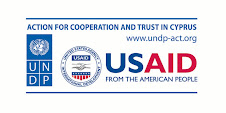The interactive workshop at the Elementary School Deryneia A was a great success.
Fourteen students, five parents and six teachers of the Elementary School Deryneia A’ came together in a two-day interactive workshop and developed their vision for a multicultural school that respects children of all cultures and with all social, cultural and ethnic backgrounds.
During the first phase of the workshop, the group focused on the triggering question: “What are the characteristics of an ideal school that values the characteristics of the new multicultural European Cyprus, for the benefit of the students?”. The students, teachers and parents generated more than 70 ideas that describe the ideal multicultural school, such as ‘children from all countries play together’, ‘all children feel comfortable in the classroom, regardless of race and home country’, ‘the parents’ association will have parents from all countries’, ‘all children can express their opinion’, and ‘a flexible school curriculum according to the composition of the school’. After clustering all ideas and voting for the most favorable ones, the workshop participants created a map of influence and structured over 25 of the ideas according to their interrelation and influence. The result is a rich map with all the ideas, showing the most influential ideas that will help materializing others, working towards the ideal multicultural school. During the second phase of the workshop, the participants determined the obstacles that need to be overcome in order to reach the visualized multicultural school, and during a follow-up workshop, the project team will assist the students, parents and teachers to develop a concrete action plan for their school.
The workshop showed the great interest and enthusiasm of students, parents and teachers to work together for a multicultural school and a multicultural society, in which all citizens and all students can benefit from one another and in which diversity is perceived as richness and not as an obstacle.
A core group of participants gathered on 26 January to design an Action Plan based on the outcomes of the previous workshop sessions. A total of 15 concrete ideas were discussed and tasks were split among the participants. Actions include interactive exercises in the classroom, multicultural games, international cooking classes and a workshop on multiculturalism for the parents’ association.
A full report on the outcomes of the workshop will be available for download soon.


